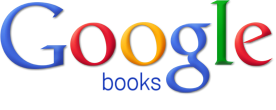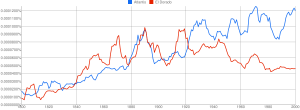As registrations are rolling in, how about another post about digital humanities? (If you haven’t yet registered, you can do so here.)
Think Google is a giant, faceless behemoth concerned only with search results and AdSense? You’re only partly right. It turns out Google is a giant, faceless behemoth with an interest in advancing the field of digital humanities! This post is a round-up of Google-initiated or Google-sponsored projects.
1. Google’s best-known contribution to digital humanities is probably Google Books:
OK, it may not fit everyone’s definition of a digital humanities project (note the conspicuous absence of any kind of interpretation), but the Google Books project has made the (published) raw materials of humanities scholarship more accessible than they have ever been before. That’s gotta count for something. Plus, it led to…
The Ngram Viewer uses the raw data (OCR’d text) from the Google Books project and lets the user search for the incidence of particular words in published books over the last couple of centuries. (Try it, it’s fun!) Compared to the controversy surrounding the Google Books project, the debates around the Ngram viewer have been small potatoes, but they sure make interesting reading for DHers. Dan Cohen wrote a great blog post about it.
3. In 2010, Google announced that it would be awarding 12 Google Digital Humanities Research Awards. The awardees include projects at the University of Michigan, George Mason University, the University of Oxford, and Universidad Complutense de Madrid. In Google’s own words:
We have selected these proposals in part because the resulting techniques, tools and data will be broadly useful: they’ll help entire communities of scholars, not just the applicants. We look forward to working with them, and hope that over time the field of digital humanities will fulfill its promise of transforming the ways in which we understand human culture.
Did we miss any other DH-related Google projects? Let us know in the comments!




My students and I used Google’s Ngram Viewer to illustrate the strength of orthographic conventions. Editing a mid-nineteenth-century American manuscript, we often encountered spellings that were attested in the OED for earlier centuries. We encoded those spellings as archaic orthography along with conventional nineteenth-century spellings, then employed an XSL stylesheet to create searches of Google’s Ngram Viewer that would allow us to visualize the relative frequency of the conventional and unconventional spellings. Here’s an example:
ruff (rough): First appears in entry for 1852-02-09 — “This morning when I arose I found the weather quite good and quite smooth so I sat down and went to work on some fancy work but did not remain so long before the wind came ahead and made it very ruff yesterday I was seasick and unable to write.”
View unconventional spelling in Google Books Ngram Viewer
-> Compare unconventional and conventional spellings in Ngram Viewer
I would like to throw in the ring Google Art Project, an online archive not only of images but of museums as well, and an invaluable source that displays digital’s ability to continue to develop waining school interests like visual literacy, an irony that should not go unnoticed in our overly-visual world but does due to the lack of funding for visual culture programs. Like most Web 2.0, there is the prosumer aspect of being able to curate your own galleries and share them with others. If anyone were interested, I would be willing to lead a GAP brief workshop (maybe in relation to other Google products?) seeing as the project is only 13+ months old and seeks to do what other archives like the Blake or Rossetti archive have attempted, but with Google resources on hand.